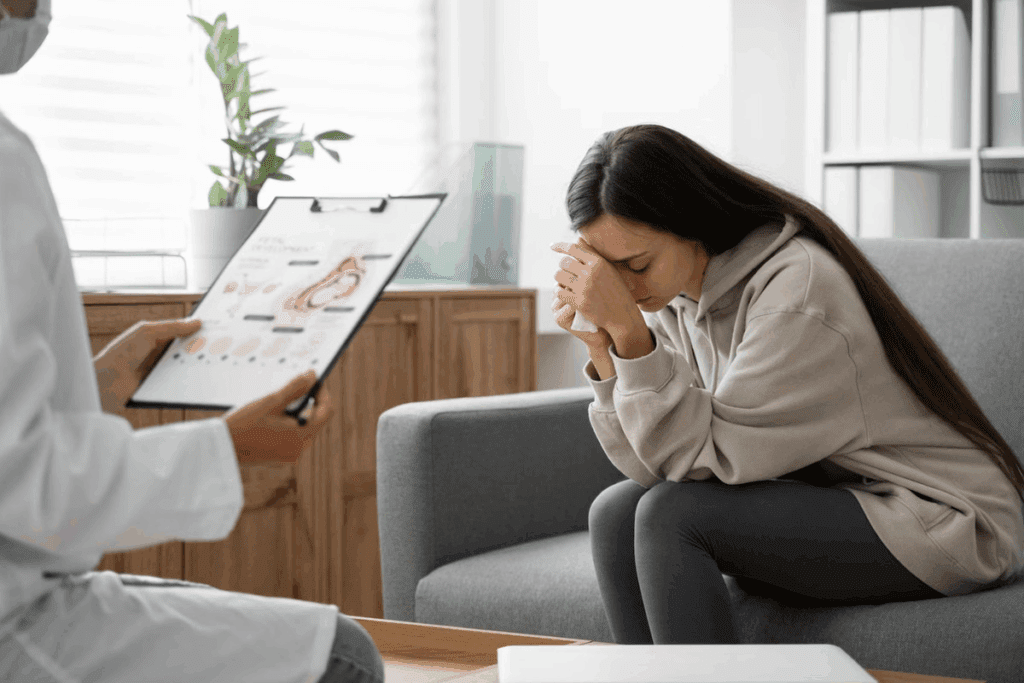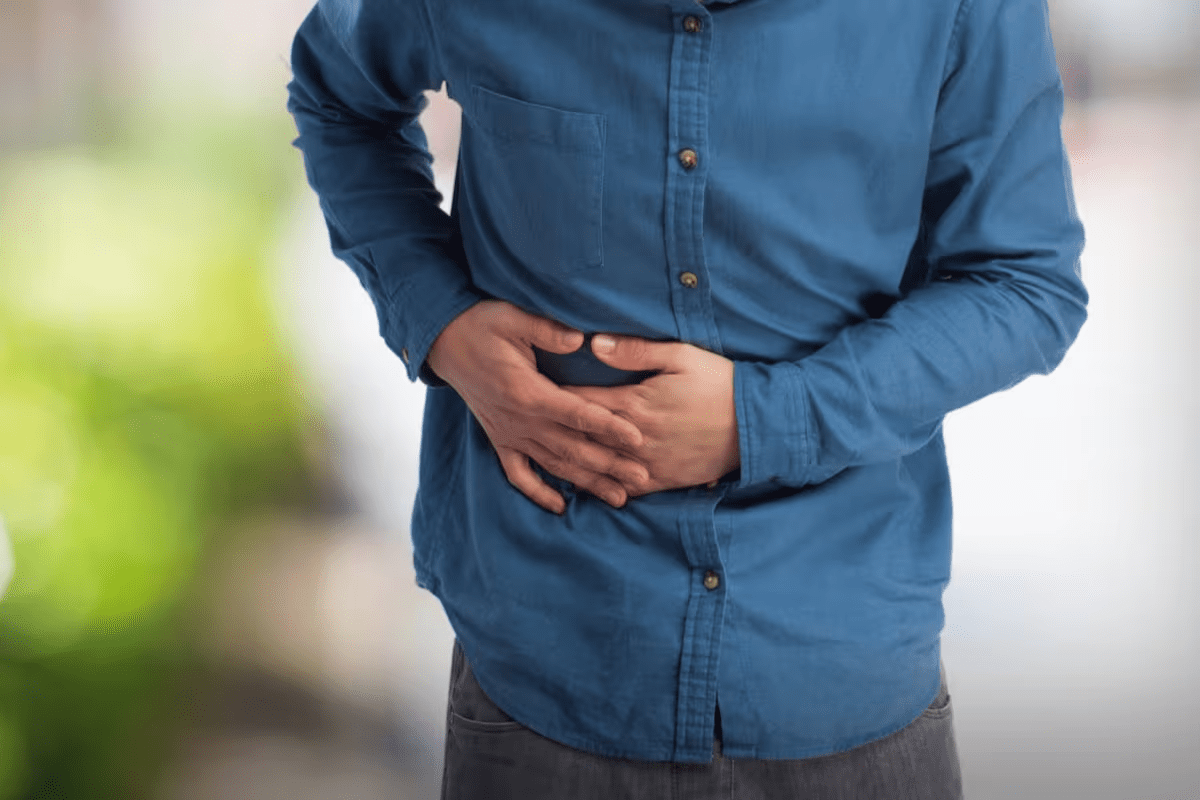
Bladder stones, or calculi, quietly form in thousands of men yearly. They cause severe pain and make it hard to urinate. This greatly affects their quality of life.
Learn the bladder calculi symptoms and a complete guide on treatment options for getting rid of bladder stones effectively.
At Liv Hospital, we know how important it is to spot the signs early. We look for evidence-based treatments to help. Small stones might not bother you, but big ones can lead to a lot of pain and bleeding when you pee.
It’s key to understand these points for the best care. We aim to give top-notch healthcare. We also offer full support to patients from abroad.
Key Takeaways
- Bladder stones can cause significant pain and urinary issues.
- Early intervention is key for effective management.
- Spotting signs and symptoms early is vital for timely treatment.
- Liv Hospital offers full care for international patients.
- We have evidence-based treatments for bladder stones.
Introduction
Bladder stones, also known as vesical calculi, are hard masses of minerals that form in the bladder. These stones can cause significant discomfort and health issues if not treated properly.
The formation of bladder stones occurs when minerals in the urine concentrate and crystallize. This often happens due to dehydration, diet, or underlying medical conditions.
Understanding the causes, symptoms, and treatment options for bladder stones is essential. It helps in managing the condition effectively.
Characteristics | Description |
Definition | Hard masses of minerals in the bladder |
Causes | Dehydration, diet, medical conditions |
Symptoms | Pain, difficulty urinating, frequent UTIs |
Treatment | Medications, surgery, lifestyle changes |
By understanding the nature of bladder stones and their implications, individuals can seek appropriate medical care. This helps alleviate symptoms and prevent complications.
Symptoms of Bladder Stones
It’s important to know the symptoms of bladder stones to get help quickly. These stones can cause mild discomfort or severe pain.
The most common symptoms include:
- Painful Urination: Many people with bladder stones feel pain or discomfort when they pee.
- Frequent Urination: You might need to pee more often and feel a rush to do so.
- Blood in Urine: Seeing blood in your pee can happen because the stones irritate your bladder.
- Difficulty Urinating: Sometimes, stones can block urine flow, making it hard to pee.
Some people might also feel:
- Lower Abdominal Pain: Pain in the lower belly or pelvic area.
- Painful Intercourse: Feeling pain or discomfort during sex.
If you’re experiencing these symptoms, you should see a doctor. Early treatment can make you feel better and prevent worse problems.
Seeking Medical Help: If you think you have bladder stones, talk to a healthcare professional. They can help figure out what to do next based on your situation.
Diagnosis of Bladder Stones
Diagnosing bladder stones involves a detailed look at symptoms, medical history, and imaging. We know how important it is to get it right for the best treatment.
The first step is a thorough medical history and physical exam. Our doctors look for signs like painful urination and frequent trips to the bathroom. These can hint at bladder stones.
To confirm, we use ultrasound and X-ray imaging. These help us see the stones and where they are.
Sometimes, we need more tests like CT scans or cystoscopy. These give us detailed views of the bladder. They help us plan the best treatment.
By using all these methods, we can accurately find bladder stones. Our aim is to give our patients the best care. We want to treat the problem quickly and effectively, easing their symptoms.
Treatment Options
Treatment for bladder stones varies based on their size and symptoms. For small stones, waiting and watching might be the best option. But, larger stones often need more serious treatments.
Treatment Approaches:
- Watchful Waiting: Monitoring the condition to see if the stones pass on their own.
- Surgical Removal: A procedure to remove the stones surgically.
- Lithotripsy: A non-invasive treatment that uses shock waves to break up the stones.
The right treatment depends on the stone’s size and the patient’s health. It’s important to talk to a healthcare professional to find the best treatment.
Prevention and Management
Preventing bladder stones requires a few steps. First, staying hydrated is key. It helps dilute urine and lowers mineral concentration. A diet full of fruits, veggies, and whole grains also helps prevent stones.
If you’ve had bladder stones before, seeing your doctor regularly is important. They might prescribe medication to help manage the condition. These steps can greatly lower your risk of getting stones again and keep your urinary system healthy.
FAQ
What are the symptoms of bladder stones?
Bladder stones can cause severe pain while urinating. You might also feel the need to urinate often or have abdominal pain. Some people have trouble starting or stopping urine flow or feel like their bladder isn’t empty.
How are bladder stones diagnosed?
Doctors use imaging tests like X-rays, ultrasound, or CT scans to find bladder stones. They also do a physical exam and take your medical history to help diagnose.
What are the treatment options for bladder stones?
Treatment depends on the stone’s size and location. Small stones might pass on their own, but bigger stones or those in hard-to-reach places might need surgery. Sometimes, doctors prescribe medicine to dissolve the stones.
Can bladder stones be prevented?
Some risk factors for bladder stones can’t be changed, but you can lower your risk. Drinking plenty of water, eating a healthy diet, and managing health conditions can help prevent them.
What are the complications of untreated bladder stones?
Untreated bladder stones can lead to serious problems, including urinary tract infections, kidney damage, and bladder damage. In severe cases, they can block the urinary tract and cause kidney failure.
How can I manage bladder stones at home?
While medical treatment may be necessary, home care can help. Drink plenty of water, avoid bladder irritants, and follow your doctor’s advice regarding pain management and medication.
References
National Center for Biotechnology Information. (2025). How to Get Rid of Bladder Stones Symptoms. Retrieved from https://www.ncbi.nlm.nih.gov/books/NBK441944/




































